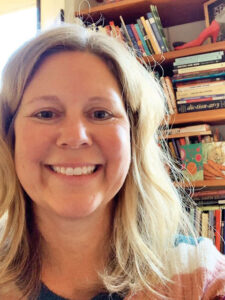 DEGREES: B.A. in religion; M.A. in Black studies, The Ohio State University; J.D., University of Connecticut School of Law
DEGREES: B.A. in religion; M.A. in Black studies, The Ohio State University; J.D., University of Connecticut School of Law
JOB TITLE: Associate professor in university studies (interdisciplinary general education), Portland State University
FAVORITE TRINITY MEMORY: I have many fond memories of my time at Trinity, including playing volleyball, freshman-year lip-sync contests in Jarvis, muddy Slip ’N Slides during Spring Weekend, and multiple internship opportunities. I am grateful for the friends I made and the excellent education I received at Trinity.
Why did you move from practicing law to teaching? After law school, I moved to Portland, Oregon. I practiced criminal defense and juvenile law for 10 years, specializing in representing teenagers in adult criminal court under Oregon’s automatic waiver law. I loved that work and felt passionate about it; at the same time, it was difficult, exhausting, and heart-wrenching work. I was offered the opportunity to teach interdisciplinary, community-based learning courses at Portland State University in the area of criminal and juvenile justice, and I welcomed the change of pace.
Your work goes beyond the typical college classroom. How? I have been at Portland State University (PSU) for 17 years. My work is centered around expanding educational opportunity for people who are currently or formerly incarcerated. I have been teaching a “Juvenile Justice” community-based learning course for many years, in which my PSU students work with young people housed in juvenile detention and provide one-on-one or small-group academic engagement and credit achievement. I also teach a course twice a year at an Oregon Youth Correctional Facility (YCF). This course provides an opportunity for a small group of students from PSU and a small group of students incarcerated at the YCF to work together in a structured peer- and collaborative-learning environment. Together, students examine a variety of social justice issues through readings, film, and discussion. Additionally, students explore and develop their own perceptions of themselves as agents of change.
In the past five years or so, I have been focused on the development of PSU’s Higher Education in Prison Program. In this role, I have had the opportunity to undertake a variety of administrative tasks, such as networking with various academic departments and administrative units, as well as with partners outside of the university; creating policy; engaging in strategic planning, grant-seeking, and fundraising; and considering various budget scenarios. I am a member of a statewide legislative task force examining postsecondary opportunity for people inside Oregon’s prisons. I also am teaching the pilot year of a yearlong, first-year, interdisciplinary general education course inside Oregon’s only women’s prison, and I plan to repeat the course next year, with a new cohort of students, while the current students move ahead in their studies through additional courses.
Who was your most memorable professor at Trinity? What was your most memorable course? Majoring in religion, I was especially interested in the intersection of faith and praxis, and the connection between spirituality and social justice. Frank Kirkpatrick, Charles “Bud” Schultz, and Cheryl Greenberg were three of my favorite Trinity professors, and all had a significant impact on me and the trajectory of my life’s work. Schultz’s “Education of the Working Class” was probably my most memorable class, where I first encountered the work of Paulo Freire and began (finally) to more deeply understand racism, power, privilege, and oppression. After graduation, I stuck around Trinity for another year, working for the Upward Bound Program. (Shout-out to Jonah Cohen ’89 and [former Upward Bound Director] Dennis Mink!). Being a part of Upward Bound, both as an undergrad and as a full-time employee, were some of the best times I had at Trinity.
How has the COVID-19 pandemic affected your work? With COVID-19, unfortunately, most of my coursework has shifted to online or correspondence learning or been temporarily halted altogether. However, there is no lack of work to be done to grow the program and to advocate for people who are currently incarcerated and at great risk from this novel virus.
Any final thoughts? As Michelle Alexander, author of The New Jim Crow: Mass Incarceration in the Age of Colorblindness, says, “It’s so important that we end the separation between ‘us’ and ‘them’—those labeled ‘prisoners,’ ‘criminals,’ ‘felons.’ It is this separation and demonization of the ‘others’—and our failure to truly see, hear, and engage with those who have been locked up and locked out—that makes it easy for us to remain in deep denial about what we, as a nation, have done.” It is an honor and a privilege to devote myself to addressing this most pressing civil rights issue of our time.
